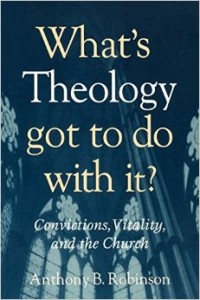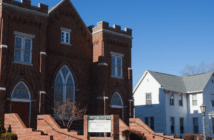Many of us intuit that there is a critical deficit of theology in contemporary congregations. Like Anthony Robinson, we have seen the “Pecos River syndrome,” a congregation that is a mile wide and a foot deep. Like Robinson, we have groped for a middle way between congregations that are indifferent to core beliefs and congregations that are uncharitable in handling their core beliefs. And like Robinson, we have longed for viable models of congregations grounded in solid theology, here defined as “core convictions and wisdom proper to the life of all believers.”
Robinson attempts to show specific connections between core theological beliefs and the practices of healthy congregations.
What makes this book unique is what Robinson does next. Robinson attempts to show specific connections between core theological beliefs and the practices of healthy congregations. These core beliefs include revelation, canon of scripture, the Trinity, God as creator, the person and work of Jesus Christ, the Holy Spirit, the image of God and original sin, justification and sanctification, Church, the sacraments, the calls of clergy and laity, and eschatology.
Three of Robinson’s many intriguing speculations are these. First, there is a connection between a  congregation’s balance of personal and social holiness and their exposure to the full canon of scripture. Second, there is a connection between a congregation’s ability to move past dated structures and programs and their familiarity with the doctrine of the Spirit. Third, there is a connection between a congregation’s ability to benefit from the shared but distinct strengths of called clergy and laity and their knowledge of the office of ministry, the ministry of all Christians, and the Spirit’s gifts to both.
congregation’s balance of personal and social holiness and their exposure to the full canon of scripture. Second, there is a connection between a congregation’s ability to move past dated structures and programs and their familiarity with the doctrine of the Spirit. Third, there is a connection between a congregation’s ability to benefit from the shared but distinct strengths of called clergy and laity and their knowledge of the office of ministry, the ministry of all Christians, and the Spirit’s gifts to both.
Robinson invites us to seek out and strengthen such connections. Not everyone will agree on those he names but most will appreciate his final goal, which, to use one of his favorite metaphors, is the congregation as spelunker – able to enter the dark recesses of the unknown because they are anchored by a rope to a fixed point outside the cave.







